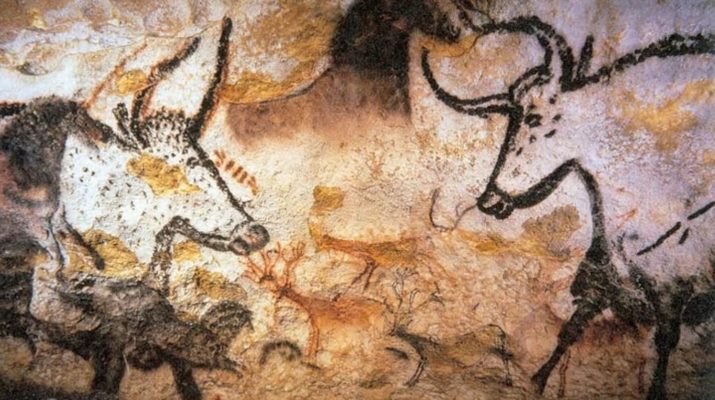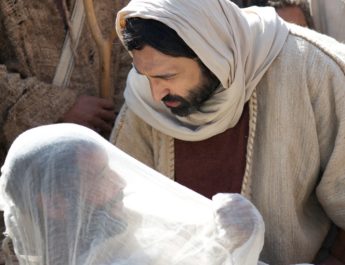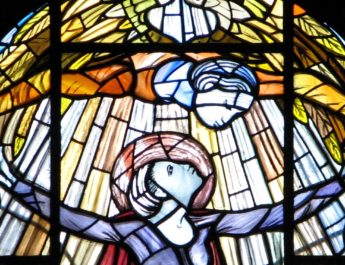Psalm 92
Narrative Lectionary 324
A Psalm.A A Song for the SabbathB Day.
1 It is goodC to give thanksD to the Lord,E
A “Psalm” = mizmor. From zamar (making music; used specially of music to worship God; music with singing, singing praise, singing psalms); may be from zamar (to trim or prune). This is a melody or a psalm.
B “Sabbath” = shabbat. From shabath (to rest, stop, repose, cease working; by implication, to celebrate). This is sabbath, literally meaning rest or intermission.
C “good” = tob. From tob (to be pleasing, to be good). This is good, beautiful, pleasant, agreeable, bountiful, at ease. This word is used for goodness as a concept, a good thing, a good person. This can refer to prosperity and welfare as well as joy, kindness, sweetness, and graciousness. So, this is ethically good, but also enjoyably good.
D “give thanks” = yadah. From yad (hand). This is to throw one’s hands into the air in a gesture of praise. So, it is to praise, give thanks, or make a confession.
E “Lord” = YHVH. From havah (to be, become) or hayah (to come to pass, become, be). This is the name of the God of Israel, the self-existent and eternal one, the tetragrammaton. This pronunciation has been lost to time so “Lord” is generally used in its place.
to sing praisesF to your name,G O Most High;H
F “sing praises” = zamar. Related to “Psalm” in superscript. See note A above.
G “name” = shem. May be from sum (to put, place, set). This is name, fame, renown. A name was thought to indicate something essential about a person – something about their individuality. So, this word can also mean honor, authority, or character.
H “Most High” = Elyon. From alah (to go up, ascend, be high, be a priority; to arise in a literal or figurative sense). This is most high, upper. It refers to elevation – so, lofty.
2 to declareI your steadfast loveJ in the morning,K
and your faithfulnessL by night,M
I “declare” = nagad. This is to declare, make conspicuous, stand in front, manifest, predict, explain.
J “steadfast love” = chesed. From chasad (being good, kind, merciful; may mean bowing one’s neck as is done in the presence of an equal for courtesy’s sake; so, if one in a superior position is treating you like an equal, that is what is captured here). This is favor, goodness, kindness, loving kindness, pity, reproach, or a good deed. When done by God to humanity, this is mercy/loving kindness. When done by humanity to God, it is piety.
K “morning” = boqer. From baqar (to seek, plow, break forth, admire, care for). This refers to the break of day. So it is dawn, early, morning, or morrow.
L “faithfulness” = emunah. From aman (to believe, endure, fulfill, confirm, support, be faithful, put one’s trust in, be steadfast. Figuratively, this is to be firm, steadfast, or faithful, trusting, believing, being permanent, morally solid). This word is literally firmness, but figuratively fidelity, faithfulness, honesty, responsibility, trust, truth, steadfastness. This word shares a root with the word “Amen.”
M “night” = layil. Properly, this refers to light twisting away. It is used for night or midnight. Figuratively, this can mean adversity.
3 to the music of the luteN and the harp,O
to the melodyP of the lyre.Q
N “lute” = asor. 16x in OT. From the same as eser (teen or -teen). This is ten or tenth. Here, a ten-stringed instrument like the lute.
O “harp” = nebel. From nabel (to fall away, faint, wither, languish, sink; figuratively, being senseless, foolish, or wicked; to despise, disgrace, or fall to nothing, to be seen with contempt). This is a vessel, perhaps made of skins for holding liquids. It could be a skin, vase, or lyre as having a similar shape.
P “melody” = higgayon. 4x in OT. From hagah (to speak, declare, make a sound, imagine, or mutter; a murmur, moan, or growl, whether from delight or anger; to study, ponder, or meditate). This is meditation, musing, or whispering. It could also be some kind of resounding music or other musical notation like play with feeling.
Q “lyre” = kinnor. Root may be to twang. This is a lyre or harp.
4 For you, O Lord, have made me gladR by your work;S
at the worksT of your handsU I sing for joy.V
R “made…glad” = samach. This is to rejoice or be glad. Properly, it is to brighten up in a literal or figurative sense.
S “work” = poal. From paal (to do, make, work, or accomplish; generally refers to regularly repeated or systematic action – to practice). This is an action or deed, conduct. It is the act of working or the work itself. It can also be wages or maker.
T “works” = maaseh. From asah (to do, make, accomplish, become). This is a word – any action whether positive or negative. It can also be a transaction, construction, activity, property, or something that is produced.
U “hands” = yad. Related to “give thanks” in v1. See note D above. This is hand, ability, power. Hand in a literal sense, but also what one can do or the means by which one does it.
V “sing for joy” = ranan. This is a cry of joy or a joyful song. Properly, it is emitting a shrill sound, especially one of joy.
5 How great areW your works,X O Lord!
Your thoughtsY are very deep!Z
W “great are” = gadal. This is to grow up, become great, become wealthy – to advance. The root meaning may be to twist in the sense of the process of growing.
X “works” = maaseh. Same as “works” in v4. See note T above.
Y “thoughts” = machashabah. From chashab (literally to weave; figuratively to think or plot something malicious). This is thought, scheme, imagination, purpose, or a plan either good or evil.
Z “deep” = amoq. 9x in OT. This is to be deep in a literal or figurative sense. It can also mean profound.
6 The dullardAA cannot know,BB
the stupidCC cannot understandDD this:
AA “dullard” = ish + ba’ar. Ish is perhaps from enosh (human, humankind, mortal); from anash (to be weak, sick, or frail). This is man, husband, another, or humankind. Ba’ar is 4x in OT. From baar (to be senseless, stupid, graze); from beir (animal, cattle); from baar (to consume, feed, kindle, be brutish). This is brutishness, foolish, senseless.
BB “know” = yada. This is to know, acknowledge, advise, answer, be aware, be acquainted with. Properly, this is to figure something out by seeing. It includes ideas of observation, recognition, and care about something. It can be used causatively for instruction, designation, and punishment.
CC “stupid” = kesil. From kasal (being or becoming stupid or foolish; properly, being fat and so figuratively silly or foolish). This is someone who is stupid, silly, or foolish.
DD “understand” = bin. This is to discern, consider, attend to. It refers to distinguishing things in one’s mind or, more generally, to understand.
7 though the wickedEE sproutFF like grassGG
and all evildoersHH flourish,II
EE “wicked” = rasha. This is morally wrong so it refers to someone who is actively bad as wicked, criminal, an evil person, offender, condemned, or ungodly.
FF “sprout” = parach. This is to sprout, blossom, bloom, spread, flourish.
GG “grass” = eseb. Root may mean to be green or to glisten. This is grass or some other tender shoot.
HH “evildoers” = paal + aven. Literally “workers of iniquity.” Paal is related to “work” in v4. See note S above. Aven is from a root that may mean panting as one does when expending a lot of energy, especially when it comes to nothing. This is nothingness, trouble, sorrow, distress, wickedness, evil, harm, sorrow, misfortune, and mischief. It is also used specifically to refer to idols.
II “flourish” = tsuwts. 9x in OT. This is to twinkle, shine, blossom. Figuratively, it is to flourish.
they are doomed to destructionJJ forever,KK
8 but you, O Lord, are on highLL forever.MM
JJ “doomed to destruction” = shamad. This is to demolish, destroy, perish, overthrow, pluck down.
KK “forever” = ad + ad. Literally “until eternity.” Ad is from adah (to advance or continue; to take away or remove; adorning oneself with ornaments). This is old, perpetuity, eternity. It is a duration going back or forward. Ad is related to “forever” in v7. From the same as ad (see above). This is as far as, while, until, before.
LL “on high” = marom. From rum (to be high, rise, exalted, become proud, display, offer, present, set apart, extol; to rise in a literal or figurative sense). This can be height, high place, or lofty. It can be either exalted or haughty/proud. It can refer to dignity or to heaven.
MM “forever” = olam. This is a long scope of time whether in the past (antiquity, ancient time) or in the future (eternal, everlasting).
9 ForNN your enemies,OO O Lord,
forPP your enemies shall perish;QQ
all evildoers shall be scattered.RR
NN {untranslated} = hinneh. From hen (lo! Behold! If, though; an expression of surprise). This is to draw attention, show suddenness or surprise, or to emphasize the importance of the coming statement. See! Lo! Behold!
OO “enemies” = oyeb. From ayab (to hate or be hostile to). This is a foe or enemy as one that you are hostile to.
PP {untranslated} = hinneh. Same as {untranslated} in v9. See note NN above.
QQ “perish” = abad. To wander off, lose self. This implies to perish, destroy, die, vanish, or be broken or corrupt.
RR “scattered” = parad. This is to divide, break through, scatter, sever, stretch, to spread oneself, or to be out of joint.
10 But you have exaltedSS my hornTT like that of the wild ox;UU
you have poured overVV me freshWW oil.XX
SS “exalted” = rum. Related to “on high” in v8. See note LL above.
TT “horn” = qeren. This is horn or hill. It can be a flask or cornet, ivory, altar corner, mountain peak, or figuratively power.
UU “wild ox” = reem. 9x in OT. From raam (to lift up). This is a wild bull or ox.
VV “poured over” = balal. This is to anoint, mix, overflow. It can also be to fodder or temper.
WW “fresh” = raanan. From raan (to grow luxuriant, grow green). This is to be fresh, green, flourish, be new or prosperous.
XX “oil” = shemen. From shamen (to shine, which implies being oily, growing fat). This is fat, oil, grease, olive oil – often with perfume. Used figuratively for fertile, lavish, rich.
11 My eyesYY have seenZZ the downfallAAA of my enemies;BBB
YY “eyes” = ayin. This is eye in a literal or figurative sense so eye, appearance, favor, or a fountain (the eye of the landscape).
ZZ “seen” = nabat. This is to behold, look at intently, consider, or scan. It can mean to have respect or regard someone favorably.
AAA “downfall” = shur. 1x in OT. From shur (to look, watch, lie in wait, care for). This is an enemy or foe as one who lies in wait.
BBB “enemies” = qum. To arise, stand, accomplish, establish, abide. This is rising as in rising against, getting up after being sick or asleep, arising from one state to another, becoming powerful, or rising for action. It can also be standing in a figurative sense.
my earsCCC have heardDDD the doom of my evilEEE assailants.
CCC “ears” = ozen. This is ear, hearing, audience, show. Properly, it is broadness – applied to its ear in reference to its shape.
DDD “heard” = shama. This is to hear, call, consent, or consider. It implies listening intelligently, giving attention, and, because of these two factors, obedience and action are often implied.
EEE “evil” = ra’a’. This is to be evil, bad, afflict. Properly, it means to spoil – to destroy by breaking into pieces. Figuratively, it is to cause something to be worthless. It is bad in a physical, social, or moral sense – something that displeases, does harm or mischief, punishes or vexes.
12 The righteousFFF flourishGGG like the palm tree,HHH
FFF “righteous” = tsaddiq. From the same as tsedeq (rightness, righteousness, just cause, vindication; that which is right in a natural, moral, or legal sense; abstractly equity; figuratively prosperity). This is just, innocent, righteous, righteous one, or lawful.
GGG “flourish” = parach. Same as “sprout” in v7. See note FF above.
HHH “palm tree” = tamar. 12x in OT. From the same as tomer (palm tree, the trunk of that tree, a post). The root may mean being erect. This is a date palm or other palm tree. This is also the root of Tamar’s name in the Bible.
and growIII like a cedarJJJ in Lebanon.KKK
III “grow” = sagah. 4x in OT. To enlarge, grow, grow up.
JJJ “cedar” = erez. Perhaps from araz (made from cedar; to be firm, strong). This is cedar or a cedar tree as strong.
KKK “Lebanon” = Lebanon. From laben (to be white, make white, make bricks) OR form Aramaic lebab (heart); corresponding to Hebrew lebab (heart, courage, one’s inner self, the mind, or the will). This is Lebanon. The sense of “white” comes from the snow on the top of its mountains. See https://en.wikipedia.org/wiki/Lebanon
13 They are plantedLLL in the houseMMM of the Lord;
they flourishNNN in the courtsOOO of our God.PPP
LLL “planted” = shathal. 10x in OT. This is to plant or transplant.
MMM “house” = bayit. Probably from banah (to build, make, set up, obtain children; to build literally or figuratively). This is house, court, family, palace, temple.
NNN “flourish” = parach. Same as “sprout” in v7. See note FF above.
OOO “courts” = chatser. From chatsar (to blow a trumpet, trumpeter, to surround); from chatsotsrah (trumpet). This is an enclosure or court – a yard that is fenced in. It could also be a village or hamlet that is walled in.
PPP “God” = Elohim.
14 In old ageQQQ they still produce fruit;RRR
they are always greenSSS and full of sap,TTT
QQQ “old age” = sebah. 19x in OT. From sib (to have gray hair, become old). This is being gray or old.
RRR “produce fruit” = nub. 4x in OT. This is to bear fruit, increase, flourish. It can also be used for speaking words.
SSS “green” = dashen. 3x in OT. From dashen (to be fat or anointed, to be fattened; to remove ashes from; figuratively, to enrich, satisfy). This is fat, rich, or fertile.
TTT “full of sap” = raanan. Same as “fresh” in v10. See note WW above.
15 showingUUU that the Lord is upright;VVV
he is my rock,WWW and there is no unrighteousnessXXX in him.
UUU “showing” = nagad. Same as “declare” in v2. See note I above.
VVV “upright” = yashar. From yashar (to be straight, right, even, smooth, or agreeable; figuratively, to make something pleasant or prosperous). This is straight, right, level. Also, it is pleasing, whether pleasing God or pleasing other people. So, it is upright or righteous.
WWW “rock” = tsur. From tsur (to confine, cramp, or bind in a literal or figurative sense; to besiege, assault, or distress). This is rock, stone, cliff, boulder, rocky. It can also be a refuge, a way to refer to God.
XXX “unrighteousness” = evel. Perhaps from aval (to deal unjustly, act in a wrongful way, a wrongdoer). This is injustice, wrong, moral evil, acts of violence, or unrighteousness.
Image credit: “Aurochs, Horses, and Deer” – cave painting from Lascaux, France, photographed in 2006.




